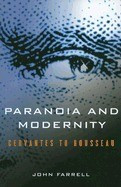Paranoia and Modernity: Cervantes to Rousseau
Cost unic de transport la toate comenzile acestui vanzator
-
Produs:Nou, Ofer garanție, Cu factură
-
Numar articol:180394767
-
Disponibilitate:Indisponibil
-
Preț:238,00 Lei
-
Anuntul a expirat la:12.01.2023, 10:36
-
Vinde si tu:Pune in vanzare un produs ca acesta
-
Optiuni:
Descriere
Vânzatorul este direct răspunzator pentru produsul afișat în această pagină.
Disponibilitate: Indisponibil - Vezi produse similare
Specificatii
Don Quixote is the first great modern paranoid adventurer. . . .
Grandiosity and persecution define the characters of Swift's
Gulliver, Stendhal's Julien Sorel, Melville's Ahab, Dostoyevsky's
Underground Man, Ibsen's Masterbuilder Solness, Strindberg's
Captain (in The Father), Kafka's K., and Joyce's autobiographical
hero Stephen Dedalus. . . . The all-encompassing conspiracy, very
much in its original Rousseauvian cast, has become almost the
normal way of representing society and its institutions since World
War Two, giving impetus to heroic plots and counter-plots in a
hundred films and in the novels of Burroughs, Heller, Ellison,
Pynchon, Kesey, Mailer, DeLillo, and others.--from Paranoia and
ModernityParanoia, suspicion, and control have preoccupied key
Western intellectuals since the sixteenth century. Paranoia is a
dominant concern in modern literature, and its peculiar
constellation of symptoms--grandiosity, suspicion, unfounded
hostility, delusions of persecution and conspiracy--are nearly
obligatory psychological components of the modern hero.How did
paranoia come to the center of modern moral and intellectual
consciousness? In Paranoia and Modernity, John Farrell brings
literary criticism, psychology, and intellectual history to the
attempt at an answer. He demonstrates the connection between
paranoia and the long history of struggles over the question of
agency--the extent to which we are free to act and responsible for
our actions. He addresses a wide range of major authors from the
late Middle Ages to the eighteenth century, among them Luther,
Bacon, Cervantes, Descartes, Hobbes, Pascal, La Rochefoucauld,
Swift, and Rousseau. Farrell shows how differently paranoid
psychology looks at different historical junctures with different
models of agency, and in the epilogue, Paranoia and Postmodernism,
he draws the implications for recent critical debates in the
humanities.
Modalitati de livrare si plata
LIVRARE
PLATA
- - Ramburs
Politica de retur
- - Produsul nu se poate returna.




